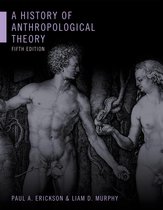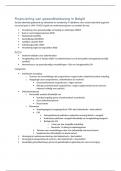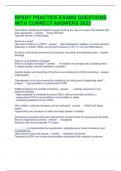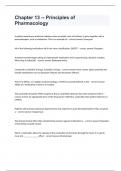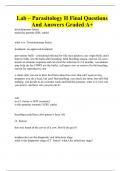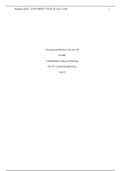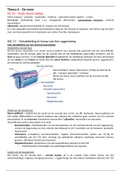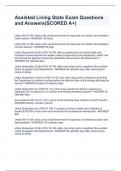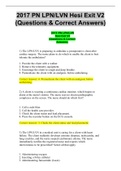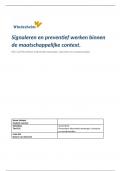THE EARLY HISTORY OF ANTHROPOLOGICAL THEORY : society and the individual
Anthro: is about understanding the character of humanity in all its diversity
and complexity
· Having an understanding of humanity it is important to know its history and look
for the origin of anthropology
· Roots lie with the traditions of the Greco-Romans “ancient” world.
Anthropology in Antiquity
The Greco-Roman world was a few centuries before the birth of Christianity.
The Greco-Romans produced intellectual traditions that these days can be separated
to scientific and humanistic of religious.
This all started with the Pre-Socrates movement
Which were cosmologists, who speculated on
- the origin and nature of the embodied world.
- These speculations could also be called materialistic —>
- they prefer natural as appose of supernatural causes
- main ideology: saw progress in the working of natural forces instead of seeing a
human ‘golden age’
The “father of history” Herodotus was one of the first people to travel and observe di-
versity in language, culture and race. He was a humanistic because he emphasized
on how human differences were caused by humans and not the divine.
After democracy was introduced a new school came: Sophistry
- (the importance lies with the practical skills ad social effectiveness rather than the
search for objective knowledge and the absolute truth.)
- emphasize that human behavior is influenced by life circumstances and not
by the gods
Behavior is linked to the term cultural relativism (cultural differences should not be
judged by absolute standards)
Socrates and Plato said that there were universal values but were difficult to perceive
and express.
Education became important since it taught people to see through there own cultural
conventions and not only manipulate them.
· Plato said that people recognize objects because of an idea they have of it .
, · He made a book on the development of society through time to show the
changes.
· What remained the same were transcendental essences (pure ideas/objects are
more real than varied individual manifestations of those ideas)
A student of Plato became more empirical —>
- examining the development of society in its own right rather than showing it as a
universal
- Seeing the relations between natural and social objects
Against the ideas of Sophistry: new school —> Stoicism
- (believed that nature and society are intrinsically orderly, allowing societies to be
compared and contrasted in accordance with universal principles.)
- Viewed the importance of universal values and the idea to be able to compare
societies
The Stoicism believed in what was later called as “tabula rasa or blank slate”. (idea
that the mind acquires knowledge through experience rather than recognized knowl-
edge that is innate)
At the end of the Roman Empire, religion such as Augustinian Christianity (theology
which became the state religion of Rome and prevailed in the first part of the Middle
Ages) got an upper hand, getting a stronghold with the socially oppressed.
This time in history (antiquity) was the establishment of the humanistic, religious and
scientific outlooks on anthropology.
The Middle Ages
After the death of Augustus (Augustinian Christianity) there was other religion that
was introduced to the people.
After the birth of the prophet Mohammed, the Island was introduced and with the help
of Arabic intellectuals such as Ibn Khaldûn, the Christianity and Islam interacted
—> changed the Christian theology.
The Christian theology became more “rational” which meant that human reason influ-
enced theological issues. This resulted in the Thomistic Christianity (the theology,
which unified scientific, humanistic and religious ways of knowing)
,People and nature were harmonized into a self-contained intellectual system.
Renaissance
Renaissance was the transition of the medieval to the modern world.
The intellectuals had a focus on:
- the antiquity
- Interest on the ancient world produced a new sense of time —> capable of
change
- (instead of the medieval and Christianity)
Erasmus (Dutch intellectual) opposed the idea of original sin
- = Christian idea that early sin resulted in the expulsion of humanity from the Garden
of Eden
- other intellectuals: against the hierarchy and the ideas formed in the time of the Ro-
mans.
What was made in the Renaissance was the tradition of secular social analysis
that was later called as cross-cultural analysis (analysis of similarities and differences
across cultures).
Voyages of Geographical Discovery
· Antipodes: (opposites, or people on opposite sides of the world) During the late
Roman imperial, Augustine used this word to say that almost all the places in
the world are already discovered, that there was nothing dramatically differ-
ent to be found.
Europeans who travelled to non-European places and met the native people saw
that the people were different to them:
, - they called them imperfect people
- and therefore Natural slaves (the early theological conception of “primitive” peo-
ples as inherited imperfect and subservient (inferior) to European Christians)
- Later (after Spanish theology, they changed the christian theology of natural
slaves): they were named Natural children: early theological conception of
“primitive” peoples as capable of “improvement” and conversion to Christian-
ity. Making them civilized Christians.
Within the 16th and 17th century, schemes were made to link the Europeans to the
non-Europeans, in anthropology these were called:
· Monogenesis: the doctrine that human races constitute a single biological
species with a common origin and with differences produced over time,
contrasted with polygenesis.
· Polygenesis: The doctrine that human races constitute separate species with
separate origins and innate differences, contrasted with monogenesis.
Other: the name anthropologists use to describe the people that they study as dif-
ferent
(postmodern-era label) Anthropologists labelled Self.
The Scientific Revolution
There are two parts of the scientific revolution: the growth of scientific epistemol-
ogy and the accumulation of the scientific knowledge.
· Epistemology: the branch of philosophy that explores the nature of knowl-
edge
Two epistemologies emerged, both employed by the practicing scientist today:
- (1) Deduction:
- = the use of logic to reason from general to particular statements
- Descartes’ version of deduction —>
- the foundation for the scientific tradition of French rationalism:
- the intellectual tradition associated with Rene Descartes and the scientific
epistemology of deduction
- Dualism would become important in the late 20th century critiques of positivism:

